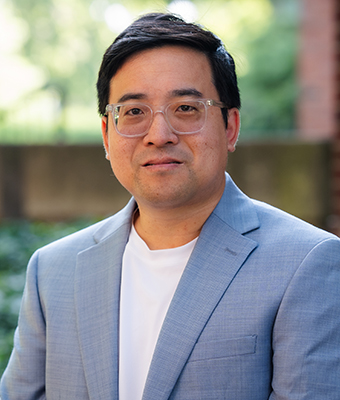
Aug 28, 2025 Business Administration Faculty Research in Education
Yang brings retail insight, investigator's eye to Gies Business

When Nathan Yang was a kid in Edmonton, Alberta, his mom opened a gift shop. He didn't know how to use the cash register, but he took shifts anyway, keeping a watchful eye on the store.
"I've always been fascinated by how retail works," said Yang. "That experience stuck with me. It's a very competitive industry; margins are very low. Yet entrepreneurs still try to make it. It's like the American dream."
Now an associate professor of business administration at Gies Business, Yang is still asking big questions about shops big and small - and drawing on a rare blend of data modeling, economic intuition, and interdisciplinary curiosity to answer them. For him, Gies is a special environment.
"Gies has world-class researchers, as well as a kind of youthful energy," Yang said. "A lot of my colleagues are recently tenured or not far from it, and there's this upward trajectory I haven't seen in a while. It has the energy of a startup."
It’s the kind of momentum that’s hard to ignore, even for someone who’s spent the last five years building a research career at one of the most established business schools in the country.
Yang's research bridges economics, marketing, and an on-the-ground investigative spirit. He studies how firms compete, how consumers behave, and how regulation changes them both. His dissertation work at the University of Toronto found him combing through old phone books in the Toronto Public Library archives; he was tracking, longhand, the location and timing of hamburger chain openings across Canada.
"It was almost like detective work," he said. "I asked the Yellow Pages if they had digital records going back to the '60s, and they basically said, 'You're going to have to go to a library for this.' So I spent five or six months just going back and forth.”
For Yang, getting it right is important even (or perhaps especially) if that means doing some leg work. When he had questions about how those chains made decisions, he went and asked face-to-face.
"I insisted on it because you get a lot of great insights. I talked to people at every chain I could," he said. "I asked someone at Wendy's, 'If you see a new McDonald's open at an intersection, what do you do?' He just said, 'It tells us we should look into it.' Real-world confirmation that you're on the right track is reassuring."
That project wasn't just about burgers and competition. It was about how retail evolves at the ground level - how chains expand, markets shift over time, and we get a Starbucks on every corner. It also demonstrated a mind willing to try new things.
"I'm unusually flexible, methodologically," Yang explained. "Some of my work is modeling, some is exploratory and descriptive. I'm a bit old school. I start with a theory, some belief about how the economy works, and let the data fill in the contours of the game. This helps me answer what-if questions."
That pragmatic curiosity - choosing the right tool for the right intriguing problem - also shapes how Yang approaches collaboration. When a project crosses disciplinary lines, he believes impact comes not just from methods, but who's in the room.
"The best interdisciplinary work has other experts involved," he said. "When we did a study on fitness and nutrition tracking, we could have just done it with other marketing and e-commerce faculty. But credibility in how we interpret this data is very important, and having nutrition scientists on board gave us that."
Amidst all of the change a new position brings, Yang is excited to step into a new world of teaching. He's taught across formats at Cornell, McGill, and Yale, but Gies will still bring firsts. After years of teaching at legacy institutions, the innovation of business education at Gies was a major draw.
"I've taught in big auditoriums and small seminars, and now I'm stepping into studio-style teaching for the first time," he said. "That's really exciting. It's very high production value. Gies is the leader of this kind of program."
This fall, Yang will teach MBA 542: Digital Marketing Analytics, a course that introduces students to the science of web analytics while exploring how data can inform real-world decisions.
For Yang, what matters most seems to be truth "on the ground" - research that illustrates how the world actually works. That philosophy makes him a natural fit at Gies.
"I think good research has a bit of investigative journalism in it," he said. "There's a lot of really valuable information that's easy to overlook. I have a lot of respect for studies that can understand the ins and outs of things. No amount of metrics wizardry or fancy AI can do that."
